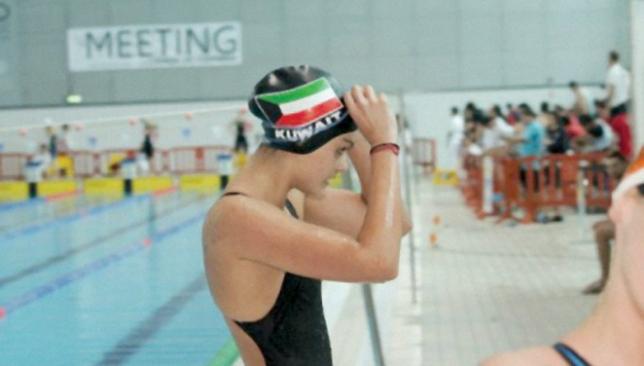
She’s going to be the first Kuwaiti female swimmer ever to compete at the Olympic Games when she jumps into the pool at the Aquatic Centre in London’s Olympic Park on Friday.
Standing at almost six-feet-tall, the 17-year-old Faye Sultan is about to make history only two years after returning to the pool, having left the sport for dance a few years back.
After the International Olympic Committee (IOC) lifted a two-year ban to allow Kuwaitis to compete under its own national flag, Sultan is now gearing up for her bid in the 50m freestyle event.
How are you feeling ahead of your Olympic debut?
Right now I’m more excited than anything. The night before my race though, the nerves will probably start kicking in.
What has your preparation been like? Are you satisfied with it?
Preparation has been really tough. I’ve been on a strict diet as well as rigorous training regime. I’m not going to lie, I’m exhausted, but hopefully that work will pay off.
There’s been quite a lot of attention on you. Is that distracting in any way, or are you happy to have a major role in encouraging Kuwaiti women in sport?
To be honest I haven’t really paid much attention to the hype. With attention there’s always going to be negative comments, especially since my choice of sport is somewhat controversial, and I don’t need to pay attention to that. I’m here to swim, so I’m not fazed by what others think. I hope what I’m doing is inspirational to females not only in Kuwait, but in the Gulf.
Faye Sultan '16 Kuwaiti Olympic swimmer to compete in Rio despite https://t.co/2sMvnraazV https://t.co/XcFGJU0gEs pic.twitter.com/QkmnCUFs8r
— Williams CollegeEphs (@EphSports) July 18, 2016
What has been your biggest swimming challenge so far?
My biggest challenge was access to training facilities and competitions.
The mess between the IOC and Kuwait has finally been settled, does it mean even more to you now that you can actually compete under the Kuwaiti flag?
I’m so happy that issue was finally resolved by our Emir, I really wanted to represent my country and was deeply upset by the prospects of having to swim under the FINA flag. Now I am able to represent my country, I could not be prouder.
There seems to be a bit of an Arab women ‘mini-revolution’ at this Olympics with many first-time achievements by athletes. Do you think it’s becoming more accepted for GCC women to compete in sport?
I hope that ‘mini-revolution’ spans into an even bigger one. I think it depends on the sport. I’d say for swimming, women need more access to coaching, facilities and competitions. There are some cultural limitations that could impede the development of women’s sports, but hopefully the participation of myself and other women in London will pave the way for others.
What do you like and not like about swimming?
Favourite would be competing in new countries and getting to meet swimmers from all over the world with their own stories to tell. As for my least favourite – thankfully I no longer have to do these anymore, but 4:30am wake-ups for morning practice. Oh and how early competitions start.
What would you consider a successful trip to the Games?
One where I’d break my personal records.
Do you have a hero, or sports idol who has inspired you?
Michael Phelps, and my great grandmother who was the first lady to complete a 90-mile bike race.
Before this, what was your biggest achievement in swimming?
Swimming in the Junior World Championships in Lima, Peru.
Now you have finished high school, what are your plans?
I will be attending Williams College, a school that offers a broadbased liberal arts curriculum. That is a fancy way of saying I have no clue what to major in and I am going to university to figure that out.
* For breaking news, follow us on @Sport360 or find us on Facebook.